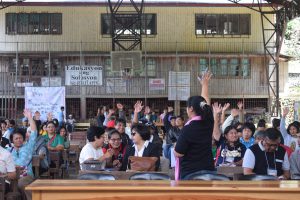
In an effort to strengthen participation and transparency among its citizenry, the municipal local government unit (MLGU) of Barlig in Mountain Province has consistently conducted a multi-stakeholder municipal-wide dialogue. For the third time, the municipality has spearheaded the conduct of Municipal Talakayan on April 16, 2019.
Themed in their local language as “Ammay ay Barlig! Mun-aapatan chi umili” (Better Barlig! A dialogue among the people), the activity was highlighted by a focused group discussion with community volunteers, civil society organizations, barangay officials, and municipal officials and employees on the development status, interventions, and plans of the municipality.
Each group were asked on their satisfaction and feedback on the services provided to them or their communities. Overall, their responses ranged from satisfied to very satisfied. However, they also articulated that the MLGU should strategize on the schedules of project implementation to avoid delays.
The participants also recommended that the MLGU should improve their agriculture services to include fisheries and livestock raising.
Moreover, the dialogue featured galleries that presented different services and programs provided and conducted by each office in the MLGU. Participants were oriented on the activities and processes of availing services from each office during the gallery tour.
Barlig Mayor Genesis Changilan who discussed the municipal development agenda said that the Municipal Talakayan provides a venue to review and revisit the needs of the town’s constituents. “With this activity, we look into the identified needs of our community rather than just blindly identifying infrastructures as solutions to problems,” he said in vernacular.
Earlier in September 2018, the municipality of Barlig issued a resolution requiring all barangay local government units to conduct a participatory situational analysis (PSA) together with community volunteers, to determine the development needs of each barangay. The result of the analysis was then incorporated in the annual investment plan and to the municipal development plan.
The PSA is a strategy introduced by the DSWD Kalahi-CIDSS for target communities to be able to determine solutions for their development needs. During the PSA, community volunteers and barangay officials participate in a workshop to identify their community problems and its possible solutions
The mayor also presented the programs of his administration that mainly bannered social services. He said that these services catered to the health, education and well-being of his people from birth to death regardless of their economic status.
Meanwhile, result of perception survey on local governance, poverty reduction and people empowerment conducted in 2016, 2017 and 2019 was presented. In terms of poverty reduction, one of the results showed that there is now enough educational facilities in the barangay compared in 2016 and 2017.
However, the survey also showed that respondents disagreed when asked if their barangay has adequate roads that can be accessed by public vehicles.
Results of people empowerment survey showed that communities including women were consistently involved in the implementation of projects and programs.
The Municipal Talakayan is a multi-stakeholder dialogue introduced by DSWD Kalahi-CIDSS to its partner communities. It aims to assess the level of development of a municipality as well as to enhance the awareness and understanding of stakeholders on local development and governance. It is being conducted annually in selected municipalities in partnership with the local government units.
The municipality of Barlig has been implementing DSWD Kalahi-CIDSS since 2014. As of the latest record, they have completed a total of 11 basic infrastructures worth 11, 319, 629.15. #DSWD-CAR, SOCIAL MARKETING UNIT, Jasmin P. Kiaso




